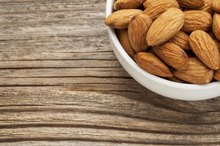What does fact checked mean?
At Healthfully, we strive to deliver objective content that is accurate and up-to-date. Our team periodically reviews articles in order to ensure content quality. The sources cited below consist of evidence from peer-reviewed journals, prominent medical organizations, academic associations, and government data.
- National Center for Complimentary and Alternative Medicine; Soy; July 2010
- American Dietetic Association; American Dietetic Association Publishes Evidence-based Nutrition Practice Guidelines for Registered Dietitians; Sept. 2006
The information contained on this site is for informational purposes only, and should not be used as a substitute for the advice of a professional health care provider. Please check with the appropriate physician regarding health questions and concerns. Although we strive to deliver accurate and up-to-date information, no guarantee to that effect is made.
Are Soy Beans a Starch?
Soy beans are used to make a variety of meatless soy products, are popular among vegetarians and may provide certain health benefits when consumed. According to the National Center for Complimentary and Alternative Medicine, soy may help lower your bad low-density lipoprotein, or LDL, cholesterol or help reduce hot flashes in menopausal women 1. All foods consist of carbohydrates or starch, protein, fat or combinations of these. People with diabetes and people trying to lose weight may consider limiting or keeping track of their starch intake. The American Dietetic Association reports that consuming a low-carb diet may be more effective than other types of reduced-calorie diets for the first six months of dieting.
Background
Soy beans are a type of legume and are the original unprocessed form of soy. Soy beans that are still in their shell are commonly referred to as edamame, and shelled soy beans are also called mukimame.
Nutritional Facts
Halva Nutrition Information
Learn More
One 1/2 cup serving of Archer Farms brand mukimame provides 120 total calories, 4.5 g of fat, 8 g of total carbohydrates, 6 g of fiber and 12 g of protein. Because carbohydrates and protein provide 4 calories per gram and fat provides 9 calories per gram, 32 of the 120 total calories in shelled soy beans comes from carbohydrates or starch, 48 calories is from protein and 40.5 calories is from fat.
Weight Management
Fiber is a type of carbohydrate. Although soy beans do provide 8 g of carbohydrates per serving, the majority of carbohydrates are from fiber. According to the U.S. Food and Drug Administration, fiber passes undigested through your digestive tract. For this reason and because high-fiber foods can help you feel full for a longer period of time, fiber can aid in weight management. The American Dietetic Association reports that consuming low-carb diets of less than 35 percent of calories from carbohydrates can result in a reduced overall energy intake. Shelled soy beans only provide about 27 percent of total calories from carbohydrates.
- Fiber is a type of carbohydrate.
- Although soy beans do provide 8 g of carbohydrates per serving, the majority of carbohydrates are from fiber.
Recommendations
Carbohydrates in Wasabi Peas
Learn More
Although soy beans are a type of legume, the U.S. Department of Agriculture, or USDA, classifies soy beans and other soy products as protein foods. For a regular 2,000-calorie diet, the USDA recommends 5.5 oz. of protein foods per day, including 4 oz. per week of nuts, seeds or soy products. The USDA encourages 12 oz. of soy products per week for a 2,000-calorie lacto-ovo vegetarian diet and 10 oz. of soy products per week for a 2,000-calorie vegan diet.
- Although soy beans are a type of legume, the U.S. Department of Agriculture, or USDA, classifies soy beans and other soy products as protein foods.
- of soy products per week for a 2,000-calorie lacto-ovo vegetarian diet and 10 oz.
Related Articles
References
- National Center for Complimentary and Alternative Medicine; Soy; July 2010
- Otles S, Ozgoz S. Health effects of dietary fiber. Acta Sci Pol Technol Aliment. 2014;13(2):191-202.
- U.S. Food & Drug Administration. FDA Vitamins and Minerals Chart.
- U.S. Department of Health & Human Services. Your Guide to Lowering Your Cholesterol with TLC. Published December 2005.
- Pereira MJ, Belver MT, Pascual CY, Martín esteban M. [The allergenic significance of legumes]. Allergol Immunopathol (Madr). 2002;30(6):346-53. doi:10.1016/S0301-0546(02)79152-0
- Legumes and Nutrition. Grains & Legumes Nutrition Council. Secondary Analysis of the National Nutrition and Physical Activity Survey 2011-2012 https://www.glnc.org.au/legumes/legumes-nutrition/. Published 2015.
- Polak, R.; Phillips, E.; and Campbell, A. Legumes: Health Benefits and Culinary Approaches to Increase Intake. Clin Diabetes. 2015;33(4):198-205. DOI: 10.2337/diaclin.33.4.198.
- United States Department of Agriculture (USDA). National Nutrient Database for Standard Reference, Release 28. Washington, D.C.; updated 2016.
Writer Bio
Erin Coleman is a registered and licensed dietitian. She also holds a Bachelor of Science in dietetics and has extensive experience working as a health writer and health educator. Her articles are published on various health, nutrition and fitness websites.









